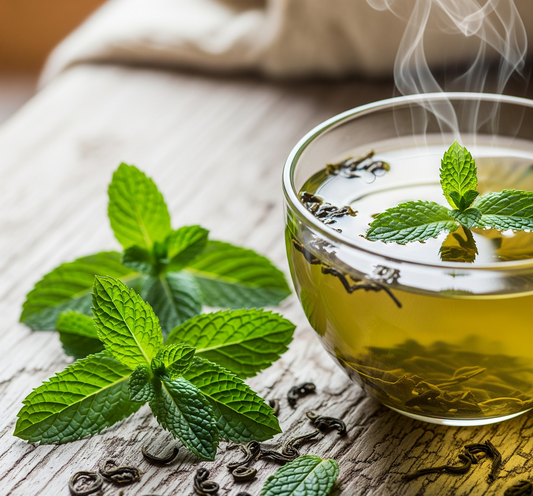Decaf tea offers a delightful way to enjoy the flavors and health benefits of tea without the jitters associated with caffeine. It undergoes various decaffeination processes, such as the carbon dioxide method and water processing, to retain its taste while removing most caffeine. Popular varieties include decaf green and black teas, both rich in antioxidants and supportive of heart health, making them ideal for tea enthusiasts sensitive to caffeine.
As tea enthusiasts, chances are high that you’re conscious of the things you decide to consume. Be it the calories in your food or the caffeine content in your beverages, it’s good to be weary of how your choices impact your overall well-being. Understanding decaf tea can be a delightful journey into the world of tea without the jitters associated with caffeine. Here we will explore the nuances of decaf tea, including its types, health benefits, and the decaffeination process.
Let’s start from the basics!
What is Decaf Tea?

To put it simply, decaf tea refers to tea that has gone through a decaffeination process to remove most of its caffeine content. While it retains some of regular tea's original flavors and health benefits, the caffeine levels are significantly reduced. This makes decaf tea an appealing option for those who are sensitive to caffeine or prefer to avoid it altogether.
Types of Decaf Tea
Any tea can be considered decaf tea if it has undergone a decafination process. However, green tea and black tea are among the most popular and widely available varieties in the market. Let’s take a look at the two:
Decaf Green Tea
Decaf green tea is made from the leaves of the Camellia sinensis plant, just like regular green tea. An 8-ounce cup of green tea typically has around 30-50 mg of caffeine. The decaffeination process involves methods like supercritical carbon dioxide extraction, which retains more of the tea's natural flavors compared to traditional methods that use chemical solvents. Studies, like this one from the National Library of Medicine, show that decaf green tea can still provide health benefits, such as antioxidants, albeit in slightly lower concentrations than its caffeinated counterpart.
Decaf Black Tea
Decaf black tea is another popular choice, particularly for those who enjoy a robust flavor. Similar to decaf green tea, it is produced from the same tea leaves but has undergone a decaffeination process. The flavor profile can vary significantly based on the quality of the leaves used and the decaffeination method. High-quality decaf black teas can deliver a satisfying taste experience, especially when paired with milk or sweeteners.

An exception here is herbal teas and tisanes that do not have any tea content or tea leaves from the Camellia sinensis plant. These beverages offer similar tea-drinking experiences to regular tea. But does not contain any tea leaves and hence, does not contain any caffeine content.
An example of these types of decaffeinated teas is our naturally decaffeinated Kathmandu Cosmos. This amazing herbal tea with its mix of healthy spices and herbs, offers a similar experience to drinking regular tea or deracinated tea.
How Much Caffeine is in Decaf Tea?
Decaf tea is the perfect choice for people looking to cut back on their caffeine intake. But have you ever wondered how much caffeine is in a cup of decaf tea? The truth of the matter is that even though it is called “decaf”, there is still a small amount of caffeine that gets through into the packaging.
The decaffeination process effectively removes around 97 to 99% of the caffeine from the tea leaves. This means that your typical 8 oz cup of decaf tea contains between 2 to 10 mf of caffeine. To put things into perspective, a regular cup of black tea has around 47 mg of caffeine per cup and coffee contains around 95 mg.
So while decaf tea does have a minuscule amount of caffeine, it is a great beverage option if you want to enjoy the taste of tea without the jittery effects of caffeine found in regular tea or coffee.
The Decaffeination Process
Decaffeination transforms your favorite teas into delightful decaf options, allowing you to enjoy the rich flavors without the jitters associated with caffeine. Here are some of the most famous decaffeination processes that help bring your tea to life while keeping the caffeine jitters at bay.
Carbon Dioxide Method
The carbon dioxide method uses supercritical CO2, which acts like both a gas and a liquid. During this process, tea leaves are placed in a container where they are pressure-cooked with CO2. During this process the caffeine molecules bond with the CO2, allowing the flavorful compounds to remain intact. This method preserves the tea's natural taste and aroma, making it a top choice for high-quality teas.
Methylene Chloride Method
Another popular process, in this method, the tea leaves are soaked in methylene chloride, a colorless liquid that bonds with caffeine molecules. This process effectively removes most of the caffeine while maintaining the tea's robust flavor. However, some tea drinkers are cautious about this method due to health concerns associated with the solvent.
While this method is effective in removing caffeine while retaining much of the tea's innate flavor, it raises health concerns due to the chemical's potential risks. This is why the U.S. imposes strict limits on residual methylene chloride in tea, allowing only 5 parts per million.
Ethyl Acetate Method
Also known as "natural decaffeination," the ethyl acetate method of decaffeination uses a solvent that is naturally found in tea. The leaves are soaked in this liquid, which extracts caffeine while leaving behind most of the flavor intact. While this process is a popular choice among tea enthusiasts, it is notorious for sometimes imparting a slightly fruity taste to the tea.
Water Processing
The water processing method is the simplest and most organic approach among its contemporaries. Here, the tea leaves are steeped in hot water to release caffeine, and then the water is treated to remove the caffeine before being reintroduced to the leaves. As you could have already guessed, this method can sometimes lead to a milder flavor. However, it comes with the benefit of being a fully safe and chemical-free option.
Health Benefits of Decaf Tea
As tea drinkers, many of us wonder, "what are the health benefits of decaf tea?" Well! We’re here to tell you that the answer is a resounding Yes! Decaf tea retains many of the health benefits associated with regular tea, although in varying amounts.
Antioxidants
Decaf tea, particularly decaf green tea, is rich in antioxidants like catechins and flavonoids. Studies by Diet vs Disease show that the catechins in green tea may help increase metabolism and burn fat. These compounds also help combat oxidative stress and may reduce the risk of chronic diseases such as heart disease and cancer.
Hydration
Another common question is, "Is decaf tea a diuretic?" While regular tea can have mild diuretic effects due to its caffeine content, decaf tea does not typically cause increased urination. Decaf tea can contribute to your daily fluid intake, helping with hydration without the stimulating effects of caffeine.
Heart Health
Research indicates that both decaf green and black teas can support heart health. A systematic review and meta-analysis in the Journal of the American Heart Association found that green tea consumption is associated with a reduced risk of cardiovascular disease mortality. The antioxidants present in these teas can help lower blood pressure and improve cholesterol levels, contributing to overall cardiovascular health.
Flavor Profile and Enjoyment
One of the most significant concerns about decaf tea is its flavor. Many tea enthusiasts still argue that decaffeination can lead to a loss of the complex and nuanced flavors found in regular tea.
While this may be true to some extent, high-quality decaf teas, especially flavored varieties, can still provide a satisfying taste experience that is similar to the flavor notes of regular teas. For instance, decaf black teas often hold up well when blended with milk or spices, making them perfect for lattes or chai.
Is decaf green tea good for you?
Despite the decaffeination process reducing the antioxidant content of green tea, it still provides some health benefits. Here are some of the pros and cons of decaffeinated green tea:
Pros
- According to GREATIST, it provides antioxidants like EGCG, but at a lesser level than regular green tea.
- Contains less caffeine, making it a good option for those sensitive to caffeine.
Cons
- Has lesser quantities of antioxidants and nutrients than regular green tea due to the decaffeination process.
- Still contains a small amount of caffeine, usually 2-10 mg per cup.
- Can be comparatively more expensive than regular green tea.
In conclusion, decaf tea is an excellent alternative for tea enthusiasts looking to enjoy the flavors and benefits of tea without the caffeine kick. Whether you prefer decaf green tea or decaf black tea, there is a wide variety to explore. The key is to choose high-quality products and experiment with different flavors to find your perfect cup.
You can also consider trying your palate at our range of premium herbal teas if you’re looking for an even higher level of caffeine-free beverages.




